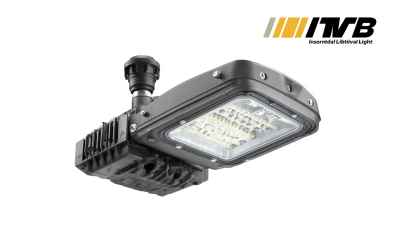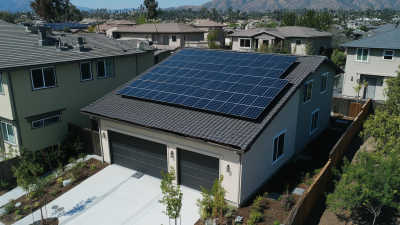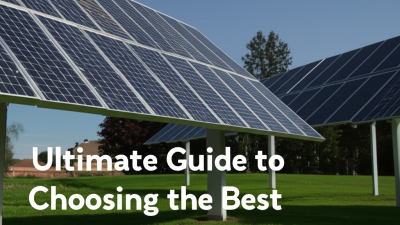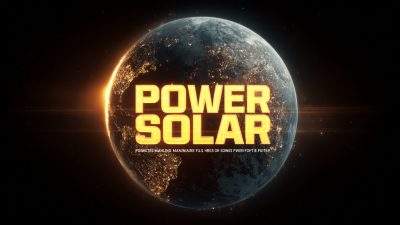Common Challenges in Sourcing High-Quality Industrial Solar Lights for Global Buyers
In the quest for sustainable energy solutions, Industrial Solar Lights have emerged as a formidable option for global buyers looking to enhance efficiency while reducing their carbon footprint. However, sourcing high-quality industrial solar lights presents a series of challenges that can complicate the purchasing process. From identifying reliable suppliers to navigating varying product standards and managing budget constraints, buyers often find themselves facing numerous obstacles. Quality assurance, performance expectations, and technological advancements further complicate the landscape, making it crucial for buyers to be well-informed and strategic in their sourcing efforts. This blog will explore these common challenges and provide insights into how global buyers can successfully procure industrial solar lights that meet their specific needs and environmental goals.

Identifying the Key Features of High-Quality Industrial Solar Lights
When sourcing high-quality industrial solar lights, buyers must focus on several key features to ensure they are making a wise investment. First and foremost, the efficiency of the solar panels is crucial. High-quality solar lights should feature advanced photovoltaic technology that maximizes energy conversion, enabling them to charge faster and last longer even in low-light conditions.
Additionally, the construction materials of the light fixture play a significant role. Durable materials, such as weather-resistant plastics or metals, can withstand harsh environmental conditions, ensuring longevity and reducing maintenance costs.
Another important aspect to consider is the illumination quality. LED technology is preferable due to its superior brightness, energy efficiency, and low heat emission. It's also essential to evaluate the lumen output—the higher the lumens, the brighter the light. For industrial applications, adequate lighting is key to safety and functionality.
Lastly, consider the smart features that some solar lights offer, such as motion sensors or remote control capabilities, which can enhance usability and energy savings, making them a compelling option for global buyers looking for reliable and efficient solar lighting solutions.
Understanding Important Certifications and Standards for Solar Lights
When sourcing high-quality industrial solar lights, understanding the important certifications and standards is crucial for global buyers. Various international standards exist to ensure that solar products meet safety, performance, and environmental criteria. For instance, the IEC 62109 standard specifies the safety requirements for power electronics in photovoltaic modules, ensuring that the lights are safe to use in various conditions. Additionally, products bearing certifications such as CE, UL, and FCC signify compliance with specific regional safety and performance standards, providing buyers with confidence in their quality.

Moreover, buyers should pay attention to certifications indicating the energy efficiency of solar lights. The ENERGY STAR label, for example, ensures that products meet strict energy efficiency guidelines set by the U.S. Environmental Protection Agency and the Department of Energy. This not only guarantees lower operational costs but also aligns with sustainability goals that many businesses strive to achieve. By prioritizing these certifications and standards, global buyers can navigate the complexities of sourcing reliable and efficient solar lighting solutions that meet their needs while adhering to regulatory requirements.
Evaluating Suppliers: Questions to Ask Before Making a Purchase
When sourcing high-quality industrial solar lights, evaluating potential suppliers is a critical step that can determine the success of your investment. Before making a purchase, consider asking the supplier about their manufacturing processes and quality control standards. An in-depth understanding of how the products are made and the measures taken to ensure consistency will give you confidence in their reliability. Additionally, inquire about the materials used; high-grade components can significantly affect the longevity and efficiency of solar lights.

Another vital question involves the supplier’s certifications and compliance with international standards. Are their products certified for safety and environmental performance? This not only helps you avoid potential legal issues but also reassures you that the lights will perform well under various conditions. Furthermore, it’s important to discuss warranty and post-purchase support. A reputable supplier should offer comprehensive service options in case of defects or performance issues, ensuring that you're covered long after the initial purchase. Taking these factors into account will help you make an informed decision and choose a supplier that aligns with your quality expectations.
Common Pitfalls to Avoid When Sourcing Solar Lighting Solutions
Sourcing high-quality industrial solar lights can present several pitfalls that global buyers should be aware of. One of the most prevalent issues is the lack of standardized quality benchmarks among manufacturers. According to a report by the International Renewable Energy Agency (IRENA), around 30% of solar lighting products in the market fail to meet basic efficiency and performance standards due to inconsistent manufacturing practices. This variability can lead to high failure rates and increased operational costs for buyers.
Tip: Before committing to a supplier, request samples and performance certifications to ensure their products meet recognized industry standards like IEC 62124 for solar lights.
Another common challenge is the oversight of local regulations and market-specific requirements. Each region may have different compliance standards, which can lead to legal complications and additional costs. The Global Solar Council highlights that nearly 25% of solar projects face delays or penalties due to non-compliance with local guidelines.
Tip: Conduct thorough research on regional regulations and engage local experts to navigate the regulatory landscape effectively. This proactive approach can help prevent costly setbacks in the sourcing process.
Tips for Ensuring After-Sales Support and Product Longevity
When sourcing high-quality industrial solar lights, after-sales support is a crucial element that can greatly influence the longevity and performance of your investment. Buyers should prioritize suppliers who offer robust warranty programs and readily available customer service. Prompt responses to inquiries and clear guidelines for maintenance can prevent minor issues from escalating into significant problems, ensuring that the lights function optimally for years to come.
Additionally, understanding the specifics of after-sales support can lead to smarter purchasing decisions. Look for suppliers that provide comprehensive documentation, including installation guides and troubleshooting tips. This not only enhances the user experience but also empowers buyers to handle minor repairs independently. Regular communication with the supplier regarding product performance and updates on advancements in solar technology can further extend the lifespan of the solar lights and maximize return on investment.
Related Posts
-

Understanding the Specifications of the Best Industrial Solar Lights and How to Choose the Right One
-

Harnessing Power Solar Innovations to Achieve Sustainable Energy Goals in 2023
-

Unlocking Efficiency: A Deep Dive into Cutting-Edge Solar Power Solutions and Performance Metrics
-

Ultimate Guide to Choosing the Best Solar Panels Lights for Your Business
-

Unconventional Applications of Solar Energy: Innovations Shaping the Future of Sustainability
-

Global Pride in Manufacturing Best Power Solar Products for a Sustainable Future
